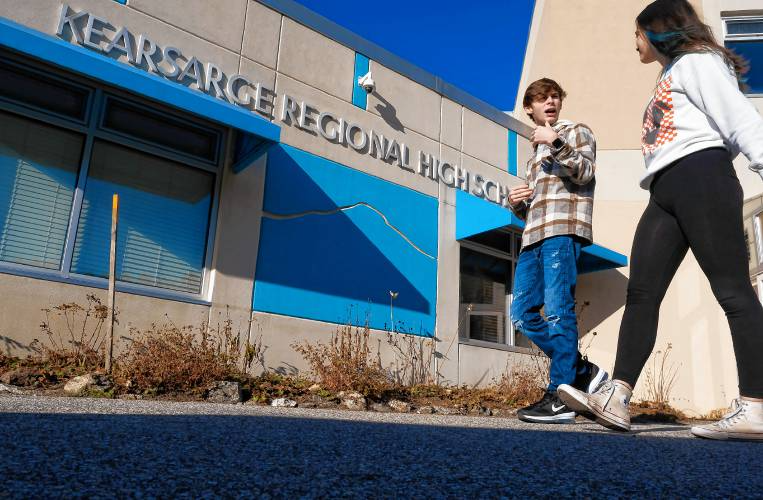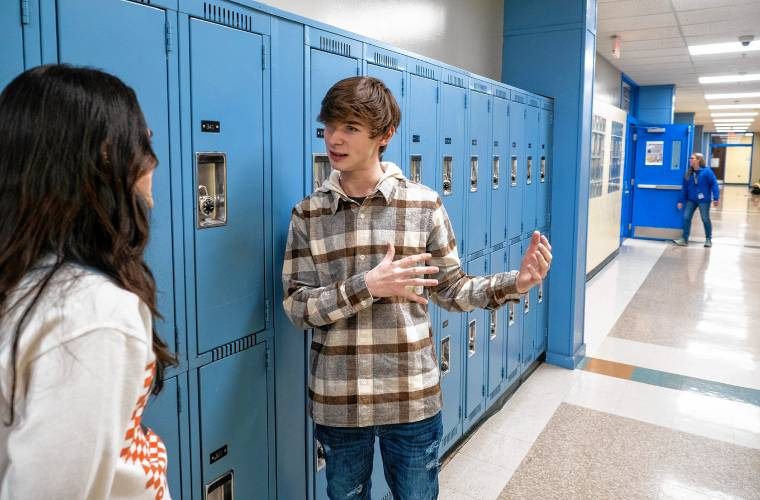Story Produced by The Concord Monitor, a Member of

Two months after the school shooting in Uvalde, Texas, in May, the New Hampshire Department of Education announced a $13 million grant program to help New Hampshire districts improve school safety. The grants are being awarded to help Granite State schools increase building security by adding features like electronic access systems, reinforced glass windows and video surveillance cameras.
But in schools across the state, a handful of high school students are pushing for a different method of preventing school violence: peer-to-peer counseling programs and reporting channels, to prevent tragedy before it begins.
Cam Wallace, 18, is a Kearsarge Regional High School senior and a student intern for the organization Safe Schools New Hampshire. In January, Wallace plans to make a presentation to his teachers and administrators at a Kearsarge Regional staff meeting about ideas for peer support programs that could help fellow students who struggle with mental health. The idea is to have a team of trained students who can recognize warning signs and reach out to those who are struggling, and connect them with the resources they need.
“We believe that when students do the outreach, students are more likely to use the tool or the resource,” Wallace said. “You know the big difference between when adults tell students to do things and when students tell students to do things.”
In one of the activities Wallace plans to recommend to his school, teachers ask students to privately write down the names of four peers they would like to sit with. The lists give teachers insight on who feels isolated and who isn’t being included by their classmates.
“It’s like looking for that lonely student inside of your classroom that’s not always easy to see,” Wallace said. “That way you can kind of work in your classroom to incorporate them and make sure that students feel included and that the classroom really feels like a place they can be their authentic selves and not feel alone.”
Safe Schools New Hampshire was founded by retired lawyer Mark G. Phillips in 2018 after the Parkland, Florida, school shooting, and aims to prevent similar violent incidents by mobilizing and training students to support each other with peer-to-peer counseling. Phillips has gathered examples of successful peer-to-peer counseling programs currently in place elsewhere in the country – like The Bandana Project from the University of Wisconsin-Madison and Room 401 from Garey High School in California – that he believes could be implemented in New Hampshire schools. Peer-to-peer counseling doesn’t claim to replace clinical treatment; it just adds extra support in environments like public schools where resources are few.
“Can you train a 16-year-old to be a lifeguard at a swimming pool to save a kid’s life? Yes. Can you train a 16-year-old in CPR to save an adult who’s having a heart attack? Yes,” Phillips said. “The question posed is, can you train a teenager to help a fellow teenager who is suffering from emotional stress without providing clinical treatment? And the answer is yes, it just hasn’t been done yet.”
Phillips said the idea is that high school students are perfectly situated to be able to support other high school students because they have the first-hand experience of being an adolescent.
“They live in fear of school shootings, they witness bullying and they have teen mental health as the number one concern among students in high schools across the country,” Phillips said. “They may not be experts in the ballistics of a semi-automatic rifle, but they really have lived experience with all these other contributing factors.”
Phillips remains skeptical that the state’s current emphasis on reinforcing school buildings will prevent school shootings alone.
“Uvalde, Parkland, they all had school resource officers, deputy sheriffs, video cameras: they didn’t work,” Phillips said. “That’s not the solution.”
Peer-to-peer support
In New Hampshire’s Dover School District, one peer-to-peer resource group focused on mental health – and particularly suicide prevention – has become an established part of school life. The Dover Mental Health Initiative was established by a group of student leaders last year after three students in the Dover High School class of 2022 died by suicide in a three-year period.
Ani Brooks, 18, a member of Dover High’s class of 2023 who is now a member of the Mental Health Initiative, recalls that when the first suicide occurred during her seventh-grade year, people did not know how to discuss it.
“We had no idea how to process these kinds of emotions. The school really did not know what to do or what to say,” Brooks said. “We just kind of watched movies in class. Some teachers would try to teach things but nothing happened. We didn’t have an assembly that was like, ‘this is what’s happened.’ It was just silence. Nobody knew what to do.”
In just over a year, Dover High’s Mental Health Initiative has grown from five to more than 30 students, who want to support fellow students and keep each other safe. The students participated in NAMI-New Hampshire’s Connect Suicide Prevention training, to learn how to identify risk factors and warning signs of suicidal ideation, and they received training to be able to hold similar trainings of their own for their peers at school. Brooks estimates they have trained over 200 fellow students so far.
“Having this knowledge about what to do and having the knowledge that our school is such an open place where you can go and talk to someone if you need help, I think that it probably has helped a lot,” Brooks said. “I like to believe that we’re taking the right steps to make sure that this does not ever happen again at our school.”
Phillips believes Dover High’s program is an idea that can be replicated in schools statewide, as a low-cost solution to support students when there may be not enough school counselors to meet the demand.
“You need simple solutions, like finding low-cost programs that students can be actively involved in creating,” Phillips said. “You don’t need $30 million.”

Anonymous tip lines
Wallace spent his summer internship with Safe Schools NH researching anonymous tip lines, a method he believes can help to improve school safety and prevent school shootings and suicides statewide. Alongside other interns, Wallace examined data from a Colorado program called Safe2Tell, an anonymous reporting system that has existed since 2007 where students can call a hotline, use the website or an app to report safety concerns. Colorado data shows students use the tip line to report a variety of concerns, ranging from suicide threats to bullying, drug use and assault.
“It doesn’t even matter if you get 100 tips or 10 tips a year,” Wallace said. “One tip out of that 10 could be life-saving to the school and to the school community.”
After the Parkland shooting in 2018, Gov. Chris Sununu formed the School Safety Preparedness Task Force and charged them with the task of identifying actionable steps that can improve the safety of New Hampshire schools without disrupting education. Among the group’s 59 solutions was a recommendation to establish an anonymous tip line to increase information-sharing from students. But in his research, Wallace found only a few of New Hampshire’s school districts are currently using anonymous tip lines, including Concord, Exeter, Hampton, Moultonborough and Winnacunnet Cooperative. Concord School District implemented its anonymous reporting system in 2019 in the aftermath of the arrest of a former teacher on sexual assault charges.
At the annual school resource officer conference in August, Safe Schools student interns surveyed 45 New Hampshire SROs about their views on anonymous tip lines. According to Wallace, most New Hampshire SROs said anonymous tip lines would be helpful, but some expressed concern that students would misuse the tip line with fake reports.
But data from Colorado’s Safe2Tell program shows that in the 2021-22 school year, fake reports made up only 2% of all reports the system received, while 97% were valid.
“When you look at Colorado’s data, the rate of misuse is very, very low, especially after a long time of the tip line being into effect,” Wallace said.
Speaking up
In October, Wallace, Brooks and five other student interns from Safe Schools organized a day-long conference for students that focused on the issues of school shootings, bullying and teen mental health. About 52 high schoolers from eight schools around the state attended the conference, which was held at St. Anselm College’s Institute of Politics. Their guest speakers were students, including Dover High alumna Ally Long, who discussed starting the Dover Mental Health Initiative. The students separated into breakout groups to discuss mental health and gun violence.
Brooks said it was interesting, coming from a school with such a prominent Mental Health Initiative, to hear about the experiences of students who attend other high schools.
“[They said] ‘there’s just no support like that for us,’ ‘we can’t even talk to our guidance counselors,’ ‘mental health is silenced at our school.’ It was really eye-opening,” Brooks said. “We’ve had a lot of tragedy at our school that’s made us get to this point where we talk about it so much, but there needs to be a way where schools don’t have to go through that and can still reach that point.”
Phillips plans to create new internship opportunities for students in the spring, which will be focused on adapting The Bandana Project’s concept – peers tying bandanas to their backpacks to identify themselves as a resource – to high school.
“They have more power than they understand and they’re capable of greater leadership than they understand,” Phillips said. “And they’ve got more to contribute in their teenage years than maybe society assumes.”
 These articles are being shared by partners in The Granite State News Collaborative. For more information visit collaborativenh.org
These articles are being shared by partners in The Granite State News Collaborative. For more information visit collaborativenh.org







